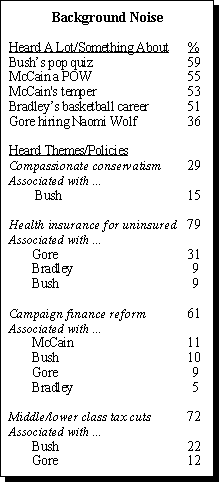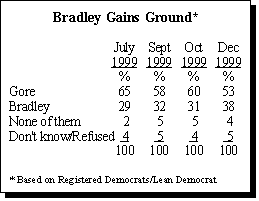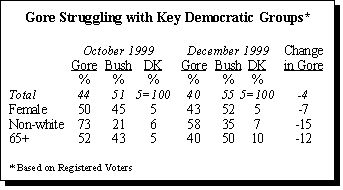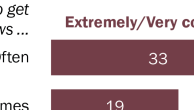Introduction and Summary

The rhetoric and events of the presidential campaign so far are having little impact on the attitudes of voters nationwide. Voter preferences are being shaped more by general impressions of the candidates than by what they are saying or by what is happening to them along the campaign trail.
While many Americans have heard of such widely-publicized incidents as George W. Bush’s inability to respond to a reporter’s pop quiz, Al Gore’s hiring of feminist writer Naomi Wolf, or criticisms of John McCain’s temper, these episodes are not meaningfully affecting opinions of the candidates. On more substantive issues, relatively few people are able to associate candidates with their main policy proposals, although many people have heard about health insurance, tax cuts and campaign finance proposals as campaign themes.
McCain and Bill Bradley are both registering slightly increased support in campaigns for their parties’ nominations, according to the latest nationwide Pew Research Center survey of 1,073 adults conducted Dec. 8-12, 1999. Bradley’s status as a former professional basketball player has more of an impact on his support than his plan to provide health insurance for the uninsured, which relatively few Americans know about. Similarly, knowing about McCain’s past as a prisoner of war in Vietnam has a direct bearing on his support, while the recent flap over his temper is having no adverse effect on opinion about him. By the same token, awareness of Bush’s failure to correctly answer questions about the names of world leaders has had no impact on his standing in the polls or on impressions of his qualifications to be president.
The poll, which asked voters to rate the leading candidates on their qualifications, positions on issues and personalities, found that general impressions are more relevant to voter attitudes at this stage than many of the things that have happened in the campaign so far. In addition, views on the general qualifications of the presidential candidates are more important than the specific stands on issues taken by Bush, Bradley and McCain. Personality was also a less important factor in opinions of all three. However, feelings about Gore’s personality are nearly as crucial to his support as beliefs about his qualifications. And the poll found that the vice president is relatively less likeable than the other major candidates.
Tightening Democratic Race

As Bradley’s insurgent campaign continues to gain ground, the race for the Democratic nomination has tightened up in recent weeks. At the same time, Bush has increased his lead over Gore in a possible general election match-up.
Gore now leads Bradley among registered Democratic voters and those who lean Democratic by a margin of 53% to 38%. The vice president’s share of the Democratic vote has fallen seven percentage points since October, precisely the same size as Bradley’s gain.
Much of the movement away from Gore has come from women, particularly white women. In October, white women overwhelmingly preferred Gore over Bradley — 68% to 23%. This month the margin has narrowed significantly — 50% to 38%.
McCain’s Steady Climb
The race for the Republican nomination remains largely unchanged from October, with Bush maintaining his commanding lead. However, McCain has gained support in recent weeks and has quadrupled his share of the vote since July. Today, 64% of Republican voters and Independents who lean Republican say Bush is their first choice for the GOP nomination. That is virtually unchanged from October when 63% considered him their first choice.
But McCain is now the first choice of 17% of Republican voters. This represents a significant increase from October when McCain’s support stood at 10%. In addition, McCain is becoming the most viable alternative to Bush for many voters. Fully 25% now consider the Arizona senator their second choice, up from 12% two months ago.
McCain has greater appeal among older voters than among young and middle-aged voters. In the current poll, 26% of those 50 and older named McCain as their first choice for the GOP nomination; this compares with 10% of those under 50. Much of McCain’s increase in support in recent months can be attributed to his popularity with older voters: In October, 13% in this group said McCain was their first choice vs. the 26% who say so now.
The rest of the Republican field remains in single digits. Steve Forbes is the first choice of 8% of GOP voters. Alan Keyes, Orrin Hatch and Gary Bauer all fall below 5%.
Recent GOP debates appear to have had only a marginal impact on voter preferences. Republican voters who closely followed the debates in New Hampshire and Arizona are slightly more likely to support McCain as their first choice for the party’s nomination, as opposed to those who paid little or no attention — 24% vs. 15%, respectively. Close followers of the debates are slightly less likely to prefer Bush (60% vs. 66%).
Gore’s Struggles
Despite some criticism Bush received from political pundits over his debate performance and lack of foreign policy expertise, the Texas governor actually increased his lead over Gore in recent weeks. Bush’s lead, which had narrowed somewhat between September and October, is back to double-digits. Registered voters now favor Bush over Gore by a margin of 55% to 40%, a slight gain from his 51%-44% advantage in October.
As has been the case throughout the fall, female indecision about Gore is behind much of the fluctuation in the two-way match-up with Bush. In October, women favored Gore over Bush 50% to 45%. Women’s preferences have shifted significantly since then; they now prefer Bush over Gore 52%-43%.

Gore has lost support among other key Democratic constituencies as well. Non-whites, while they still prefer Gore over Bush, have shifted away from the vice president in significant numbers. In October, 73% said they would vote for Gore compared to 58% today.
Senior citizens have also migrated away from Gore. In October, voters 65 and older preferred Gore over Bush by a margin of 52% to 43%. Today, they prefer Bush 50%-40%. While Gore has made some gains among independent voters, he has lost the support of some of his own party faithful. Today, 73% of Democrats say they’ll vote for Gore over Bush. The Texas governor has more solid support from his own party loyalists — 90% of Republicans say they’ll vote for him over Gore.
Bradley fares about as well as Gore in a two-way match-up with Bush. Under this scenario, 54% of voters say they would vote for Bush, while 41% say they would vote for Bradley. Bradley does run stronger than Gore among higher-income voters and those with a college degree.




